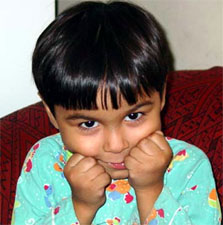Apr 15, 2025
Apr 15, 2025
 In real estate there are only three factors worth considering - position, position and position. Investors know the importance of location. Buying the worst house or property in the the best street is considered a smarter option than buying a terrific property in a less than desirable location. Location is also important in human development. Keen observers of human behavior realize the importance of birth order and its affects on a child's behavior, personality and performance.
In real estate there are only three factors worth considering - position, position and position. Investors know the importance of location. Buying the worst house or property in the the best street is considered a smarter option than buying a terrific property in a less than desirable location. Location is also important in human development. Keen observers of human behavior realize the importance of birth order and its affects on a child's behavior, personality and performance.
It is fascinating to look at the similarities and differences between children in families according to the perspective of birth order.
A first born child is in a revered but somewhat difficult position in his or her family. They are often burdened by exceedingly high parental expectations, particularly if they are boys. For a time they are the only children who gain undivided attention from their parents and even grandparents. Their every move is under scrutiny. A quick check of most family photo albums will probably show twice as many photos of a first born than any other child - particularly when they were babies and toddlers.
The first born position is almost regal and worth preserving. The arrival of a second alters this idyllic situation so first-borns often spend a great deal of their time and energy demonstrating their ascendancy over others. "Look mum he's being naughty again" is often the first-born's anthem as they go to great lengths to show parents how much better than younger siblings they can be.
First-borns are also trail-blazers for the siblings that follow. They are continually taking their parents into new ground - breaking them in for the benefit of the others who follow. Many children complain that their parents are often stricter and more anxious about raising first-borns than they are with the children that follow.
The youngest child, particularly when there are three or more children, has a favored position in the family. Unburdened by the high expectations that many parents have for their eldest children many youngest experience greater success than their siblings or they will make their mark in life in a very individualistic way.
Many have greater freedom than their elder siblings as their parents tend to be less anxious about their development and provide them with more space and opportunity to go their own way, than was given to elder siblings.
As the youngest in a family of four I had far greater freedom than any of my siblings. My parents admitted that they had learned from experience which of my childhood and adolescent behaviors they should ignore and those that they should pick up. To put it mildly I had a good time of it at home.
Recently, an old family friend put my favored treatment more bluntly. "You were spoiled rotten when you were young. You had everything your own way," she reminded me. That is often the way for the youngest!
And some parents have difficulty letting go of their youngest child. We usually can't wait to let our eldest stand on their own two feet however, we have a habit of holding our youngest back. Many youngest children complain that even as adults their parents still refer to them as the baby of the family.
Second born children are often born into a competitive atmosphere, due to the pressure exerted by the eldest. Second-born often adopt behaviors and characteristics that are the exact opposite of the first-born. Often when a first-born is cooperative and pleasant, the second will be the trouble-maker. At least everyone knows he or she is around. Or if the eldest is the academic the second-born may be the sportsperson or excel in the arts. The second-born are often the black sheep of their families choosing to make their mark in unconventional ways.
Only children spend much of their early years in the company of adults, so it is not surprising that they often develop characteristics that please their elders. Sometimes precocious, sometimes pampered, only children often prefer their own company and have little trouble keeping themselves occupied. They can also carry the entire weight of their parents' expectations which can be a burden to carry around.
The wider impact of a person's birth order is often underestimated. There is significant evidence to suggest that family position influences career paths and even our choice of life-time partner. Anecdotal evidence suggests the number of first-borns who hold positions of responsibility and power in both community settings and within the workplace is greater than second-born or other positions.
When choosing a partner for life birth order may be a more accurate indicator of compatibility than a horoscope. I suspect there is a large number of first born women with experience caring for younger siblings as children who have married a youngest born who is just looking for a mothering type. A little research amongst the people around you will reveal that such notions are not as far-fetched as they might sound.
04-Dec-2005
More by : Michael Grose

|
Hello, I learned a lot of things i didn't know. Thank you, Kevin |

|
Greetings, This article is very interesting, thanks for the time. -Anon 16845 |

|
hello, this text help me alot, good luck |

|
good |